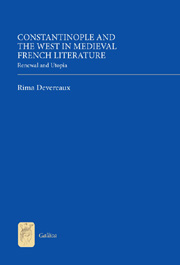Book contents
- Frontmatter
- Contents
- List of illustrations
- Dedication
- Acknowledgements
- List of abbreviations
- Note to the reader
- Introduction
- Part I Renewal and Utopia: The Terms of the Debate
- Part II Constantinople Desired
- Part III The Renovatio of the West
- Conclusion
- Appendix 1 Original Latin Quotations
- Appendix 2 References to Constantinople in Other Epics and Romances
- Appendix 3 Outline of Events in the History of East–West Relations from the Second Crusade to the Palaeologan Reconquest
- Bibliography
- Index
- Already Published
- Frontmatter
- Contents
- List of illustrations
- Dedication
- Acknowledgements
- List of abbreviations
- Note to the reader
- Introduction
- Part I Renewal and Utopia: The Terms of the Debate
- Part II Constantinople Desired
- Part III The Renovatio of the West
- Conclusion
- Appendix 1 Original Latin Quotations
- Appendix 2 References to Constantinople in Other Epics and Romances
- Appendix 3 Outline of Events in the History of East–West Relations from the Second Crusade to the Palaeologan Reconquest
- Bibliography
- Index
- Already Published
Summary
We have seen that the West's literary representation of its relationship with Constantinople provided one means of enacting the debate between renewal and utopia, a debate which served different roles in different contexts and can also contribute to our understanding of the texts' generic status.
First of all, we can conclude that the relationship between the West and Constantinople in medieval texts enacts a debate on the idea of the city as renewal and as utopia. The texts in part I, Gautier d'arras's Eracle and the Pélerinage de Charlemagne, exemplify a tension between the perception of the city as a means for renewal (as model or ally) and as utopia. In Eracle, Constantinople is a focus for aemulatio, but Western translatio and renovatio remain merely implicit. The texts in part II – Girart de Roussillon, Partonopeus de Blois, Robert de Clari's Conquête de Constantinople and the Franco-italian Macario – shed light on the complex implications of desiring the city by pointing out the degree of conflation and confusion that exists between aemulatio and admiratio, and between renewal and utopia. In the first two of these texts, the complex interaction between these concepts is a function of the texts' preoccupation with an explicit relationship between Byzantium and the West in the intra-diegetic context. In the last two texts, the emphasis lies on the hope of transforming not only aemulatio, but also admiratio, into a means for renewal.
- Type
- Chapter
- Information
- Constantinople and the West in Medieval French LiteratureRenewal and Utopia, pp. 183 - 188Publisher: Boydell & BrewerPrint publication year: 2012



